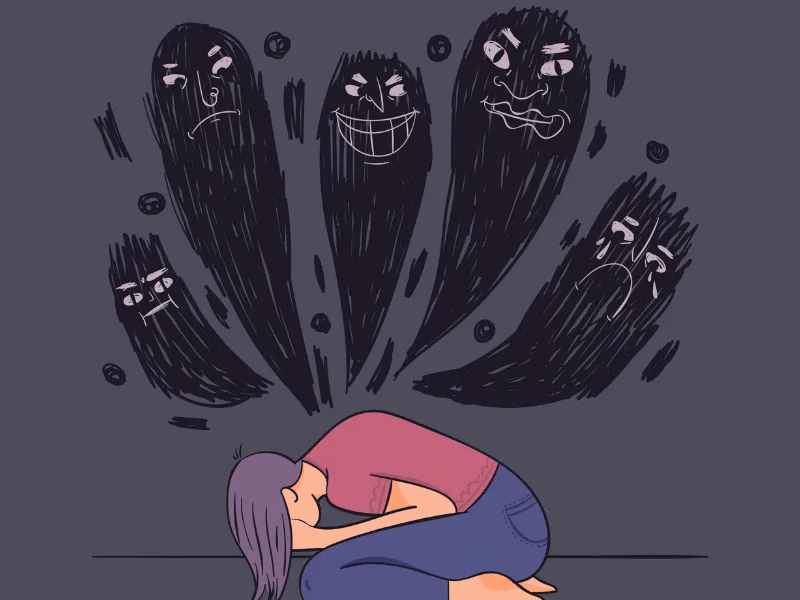How Long Can You Get Disability For Postpartum Depression?
Published: 28 Apr 2025
Postpartum depression is a serious mental condition for women who have suffered from childbirth or miscarriage. It is because of a sudden hormonal change in the body. But here the question arises, how long can you get disability for postpartum depression?
The answer to this question is not simple. At the end of this article, you will be clear about the duration of disability for postpartum depression.
1- What Is Postpartum Depression (PPD)?
Postpartum depression is a critical mood disorder experienced by new mothers after childbirth. In PPD, you may feel severe mood swings, hopelessness, restlessness, an urge to cry, and panic attacks. (1)

You may confuse PPD with baby blue, a mental condition that occurs after a few days of childbirth to a few weeks, but it is less severe than PPD.
Feeling overwhelmed after childbirth? You’re not alone. Keep reading to find out if your symptoms might qualify for support
2- Is Postpartum Depression Considered a Disability?
Yes, PPD is considered a disability.
A person with a disability who has a physical or mental impairment that substantially limits one or more major life activities. This includes people who have a record of such an impairment, even if they do not currently have a disability. It also includes individuals who do not have a disability but are regarded as having one. (2).According to the Americans with Disability Act (ADA)
So if you are suffering from PPD, you have the full right to disability. You can get the benefits of maternity leave and accommodation in the workplace, including a modified and flexible schedule.

But to get these benefits, you will need to apply for the medical proof to get diagnosed as PPD.
Wondering if you can get benefits? Let’s dig into how PPD is treated under the law
Do All Postpartum Depression Cases Qualify for Disability?
No, not every case of PPD is eligible for disability. Eligibility for disability for the PPD depends on the severity and duration. If the PPD affects the major activity of life, or is expected to extend for at least 6-12 months, you may get the benefits of disability.

Curious about how many weeks or months you could actually get support? Let’s break it down
3- So, How Long Can You Get Disability Benefits for Postpartum Depression?
- Short-term disability: Usually 6 weeks to 6 months.
- Long-term disability: Only if PPD stays severe for over 12 months and keeps you from working.
3.1 What to Know About Short-Term Disability for PPD
- This is the most common option right after childbirth.
- It often covers the first 6 weeks after delivery.
- But if your doctor confirms postpartum depression, you could get extended benefits, sometimes up to 6 months, depending on the policy.
Some moms get approved for extra time off because they are still deeply struggling with depression after the standard recovery period.
3.2 How Long-Term Disability Works for Severe Postpartum Depression
- If postpartum depression stays very severe and makes it impossible to work even after several months, you might apply for long-term disability.
You usually must prove that your condition will last at least 12 months or more.
This is harder to qualify for and often needs strong medical evidence.
Consistent therapy sessions, psychiatric evaluations, and medication records help support your LTD claim.
3.3 Important: The Waiting Period Before You Get Paid
- Most disability insurance has a waiting period before you can start getting payments.
- This is usually about 30 to 90 days after you stop working.
Every case is different. Some moms feel better after a few weeks, while others need much longer support. It’s important to focus on healing at your own pace.
Think everyone’s case is the same? Not really! Keep going to see what could make your disability last longer, or end sooner.
4- Factors That Decide How Long Your Disability Benefits Last
When it comes to getting disability benefits for postpartum depression (PPD), a few important things can decide how long you’ll be supported. Let’s keep it simple:
4.1 How Severe Your Symptoms Are
- Severe depression: If you’re deeply struggling, like feeling hopeless, unable to get out of bed, or having serious anxiety, your benefits may last longer.
- Mild sadness: If your symptoms are lighter and you’re improving fast, your disability period might be shorter.
A mom with severe PPD needing hospital care may qualify for long-term help, while someone feeling just a little down might only need a few extra weeks.
4.2 How Well You Respond to Treatment
- Good response: If therapy or medication starts working quickly, the disability support might end sooner.
- Slow response: If healing takes time, you could stay on benefits longer.
Always keep attending your appointments and following your treatment plan, as this shows you’re trying to get better!
4.3 Doctor’s Updates and Medical Reports
- Your doctor’s opinion is super important.
- Regular updates about your condition can extend (or shorten) your benefits.
- Insurance companies rely heavily on what your doctors write in their reports.
Keep all your doctor’s notes and reports safe; you’ll need them for claims
4.4 Your Insurance Company or Government Program Rules
- Different insurance plans and government programs (like SSDI in the U.S.) have their own timelines and rules.
- Some may be strict and only allow a few months, while others are more flexible.
Some short-term disability plans only cover up to 12 weeks unless you submit extra medical proof.
It’s not just about how you feel. It’s also about what’s on paper, your doctor’s notes, your treatment record, and your insurer’s rules all play a big part.
Ready to take the first step toward getting help? Here’s a super simple guide you can actually follow.
| 5- How to Apply for Disability for Postpartum Depression |
|---|
(Step-by-Step Guide You Can Actually Follow!) Applying for disability benefits when you’re dealing with postpartum depression (PPD) might feel overwhelming. But don’t worry, I’ll walk you through it step by step. 5.1 See a Doctor First
 Real-life tip Some moms find it easier to open up to their OB-GYN first, as they often understand PPD very well. 5.2 Get a Clear Diagnosis and Treatment Plan
This plan is your golden ticket for your disability application.  5.3 Gather All Your Medical RecordsCollect copies of:
 Quick Tip Keep everything organized in a folder! It’ll save you tons of stress later. 5.4 Fill Out Disability FormsIf you’re applying through:
Important Answer honestly and clearly about how PPD affects your ability to work or function daily. 5.5 Wait for the Review Decision
Heads Up:
Pro Tip Having a lawyer who knows disability claims can make the process smoother and help if you need to appeal. Applying for disability during postpartum depression is like building a case, doctor’s proof, clear forms, and a lot of patience will get you there. |
Don’t let small mistakes mess up your claim! Check this list before you apply.
| 6- Top 3 Mistakes That Could Ruin Your Postpartum Disability Claim |
|---|
Applying for disability can already feel like a lot, right? 😩 Let’s make it easier by avoiding some of the most common mistakes that cause delays or denials. 6.1 Not Enough Medical Evidence
Tip Make sure your medical records clearly show how PPD affects your ability to work, care for yourself, or function daily. 6.2 Waiting Too Long to Apply
Advice Apply as soon as your doctor says your PPD is serious enough to interfere with work or daily life. 6.3 Giving Incomplete or Wrong Information on Forms
Pro Tip Double-check your forms before sending them. Strong proof, early action, and accurate paperwork: these three things can make or break your disability claim for postpartum depression. |
7-Real-Life Experiences
When it comes to extending SDI (State Disability Insurance) for postpartum depression, real stories on Reddit show that the process can be a bit tricky but manageable if you stay consistent with your care.
- One mom shared that Kaiser usually does not extend SDI easily. It’s not just about getting a doctor’s note, you have to see a doctor regularly. They often require you to attend counselling sessions, and the doctor decides how long you qualify based on your condition.
- Another parent mentioned that SDI can be extended for up to 52 weeks (about one year). But the extension depends on your doctor’s certification, and not everyone gets a long-term approval right away.
- One user explained that most doctors need to check and certify your condition every month. After applying for SDI, you’ll automatically get extension forms by mail. But you must act fast—you usually have only 21 days to submit them back.
- Another experience showed that if your doctor feels you need more time for recovery (based on medication, therapy sessions, or questionnaire scores), they can continue extending your leave in 4-6 week blocks.
- Someone also said that job protection lasts only 12 weeks under job laws, even if your SDI continues longer. So, while you can keep getting disability pay, your job may not stay secure beyond that period.
- One user had success after their doctor extended their SDI for postpartum depression twice. They had to attend regular video check-ins and show they were actively in treatment to get extensions.
8- Conclusion
So, guys, in this article, we’ve covered the question How Long Can You Get Disability For Postpartum Depression? in detail. Postpartum depression can have a serious impact, but there are ways to get support through disability benefits when needed.
I recommend acting sooner rather than later; waiting too long can complicate things. If you’re struggling or know someone who is, start the conversation with your doctor today.
9- FAQs About Disability and Postpartum Depression
Disability benefits for postpartum depression typically last for 6 weeks to 6 months for short-term disability. Long-term disability may apply if symptoms persist beyond 12 months.
Disability benefits are usually available for severe cases that affect your ability to work. Mild symptoms might not qualify, but it depends on your doctor’s assessment.
Short-term disability covers the first few months after childbirth, while long-term disability applies if the depression persists and significantly impacts your ability to work for over a year.
You’ll need medical documentation, including a diagnosis from a doctor and a treatment plan. Regular updates and records from your healthcare provider will also support your claim.
You should see a psychiatrist, therapist, or your OB-GYN. They can provide the necessary diagnosis and treatment plan required for your disability claim.
It can take anywhere from a few weeks to a few months to receive a decision after applying. Processing times vary depending on the insurance provider or government agency.
Yes, you can appeal a denial. It’s important to gather additional medical evidence and, if needed, consult with a lawyer specializing in disability claims.
Yes, keep all doctor’s notes, treatment plans, and any records related to your postpartum depression. These will be crucial for your disability claim.
If you don’t qualify for disability, you might explore other options like family leave, mental health support programs, or other benefits offered by your employer or government.
Start by speaking to your healthcare provider, then gather your medical records. You may also consider consulting a disability lawyer or a claims expert to guide you through the application process.
10- References
At MedicaWire, all medically sensitive content is reviewed by licensed healthcare professionals. Our team ensures that the information you read is accurate, up-to-date, and based on trusted medical sources.
Learn how we maintain high standards by reading our Editorial Policy.
📚 Sources
1- https://www.nimh.nih.gov/health/publications/perinatal-depression
2- https://adata.org/faq/what-definition-disability-under-ada
ℹ️ Our Promise
MedicaWire follows strict sourcing guidelines and only references peer-reviewed studies, academic institutions, and reputable medical associations. We update content regularly to reflect new health information.

- Be Respectful
- Stay Relevant
- Stay Positive
- True Feedback
- Encourage Discussion
- Avoid Spamming
- No Fake News
- Don't Copy-Paste
- No Personal Attacks



- Be Respectful
- Stay Relevant
- Stay Positive
- True Feedback
- Encourage Discussion
- Avoid Spamming
- No Fake News
- Don't Copy-Paste
- No Personal Attacks



